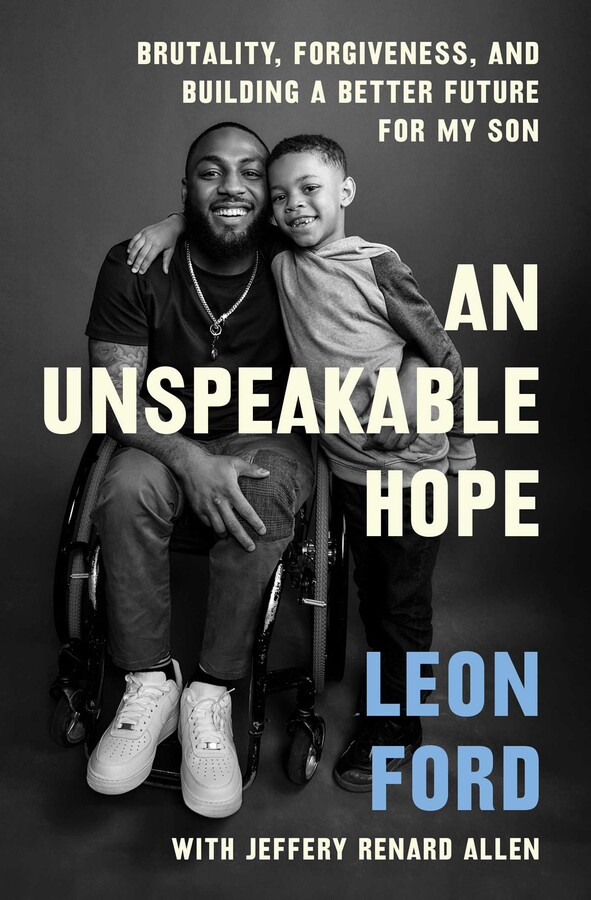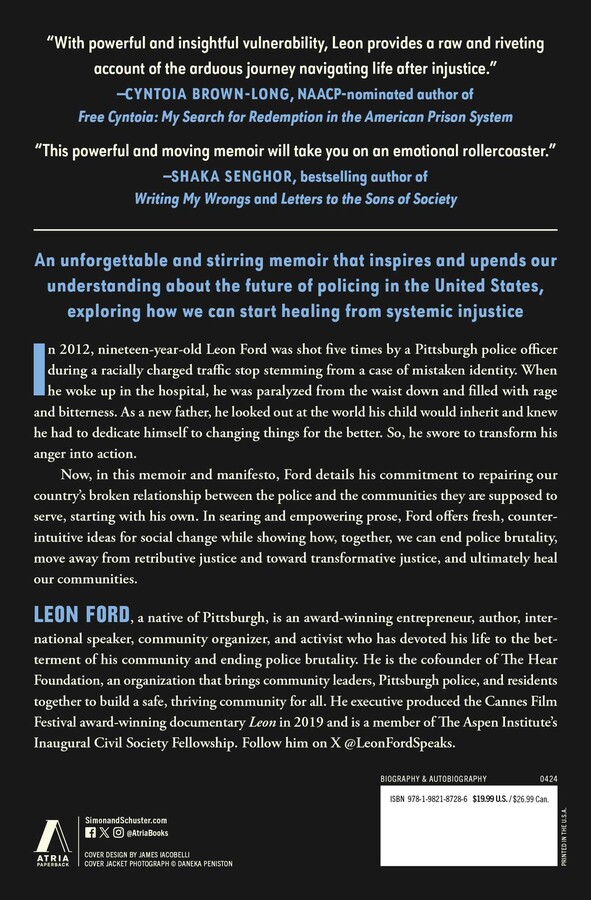Plus, receive recommendations and exclusive offers on all of your favorite books and authors from Simon & Schuster.
An Unspeakable Hope
Brutality, Forgiveness, and Building a Better Future for My Son
By Leon Ford
With Jeffrey Renard Allen
Table of Contents
About The Book
A “powerful and insightful” (Cyntoia Brown-Long, author of Free Cyntoia) memoir in the vein of Just Mercy and The Sum of Us that upends our understanding about the future of policing in the United States and explores how we can begin healing from systemic injustice.
In 2012, nineteen-year-old Leon Ford was shot five times by a Pittsburgh police officer during a racially charged traffic stop stemming from a case of mistaken identity. When he woke up in the hospital, he was faced with two life-changing realities: he was a new father, and he was paralyzed from the waist down. Leon found the only way to move forward was to let go of his bitterness and learn to practice forgiveness.
Now, in this memoir and manifesto, Leon illustrates how this harrowing experience has inspired a deep reckoning with the issues his community is facing, not only with police brutality, but also an epidemic of street violence, toxic masculinity and its impact on Black fatherhood, and the lack of disability rights and mental health access in disenfranchised communities. In the wake of countless similar shootings across the country, Leon details how he turned towards social activism, dedicating himself to bridging the gap between the police and the communities they are supposed to serve.
With a voice filled with “healing, triumph, and resilience” (Shaka Senghor, bestselling author of Writing My Wrongs), Ford offers fresh, counterintuitive ways we can effect social change. Leon shows us how, together, we can move away from retribution and towards transformative justice in order to end police brutality and heal as a country. As he once said, “Lead with love. Start compassionate conversations even with individuals and systems that have caused you pain. I know from experience that you can make your pain purposeful.”
In 2012, nineteen-year-old Leon Ford was shot five times by a Pittsburgh police officer during a racially charged traffic stop stemming from a case of mistaken identity. When he woke up in the hospital, he was faced with two life-changing realities: he was a new father, and he was paralyzed from the waist down. Leon found the only way to move forward was to let go of his bitterness and learn to practice forgiveness.
Now, in this memoir and manifesto, Leon illustrates how this harrowing experience has inspired a deep reckoning with the issues his community is facing, not only with police brutality, but also an epidemic of street violence, toxic masculinity and its impact on Black fatherhood, and the lack of disability rights and mental health access in disenfranchised communities. In the wake of countless similar shootings across the country, Leon details how he turned towards social activism, dedicating himself to bridging the gap between the police and the communities they are supposed to serve.
With a voice filled with “healing, triumph, and resilience” (Shaka Senghor, bestselling author of Writing My Wrongs), Ford offers fresh, counterintuitive ways we can effect social change. Leon shows us how, together, we can move away from retribution and towards transformative justice in order to end police brutality and heal as a country. As he once said, “Lead with love. Start compassionate conversations even with individuals and systems that have caused you pain. I know from experience that you can make your pain purposeful.”
Product Details
- Publisher: Atria Books (April 23, 2024)
- Length: 320 pages
- ISBN13: 9781982187286
- Lexile ® 840L The Lexile reading levels have been certified by the Lexile developer, MetaMetrics®
Browse Related Books
Resources and Downloads
High Resolution Images
- Book Cover Image (jpg): An Unspeakable Hope Trade Paperback 9781982187286
- Author Photo (jpg): Leon Ford Photograph by Deneka Peniston(0.1 MB)
Any use of an author photo must include its respective photo credit














